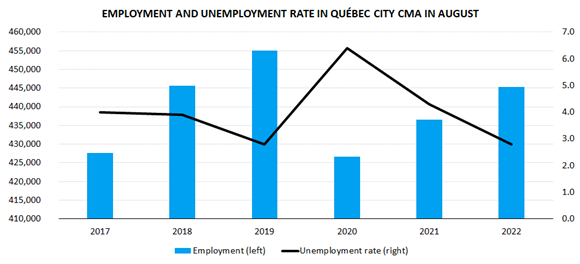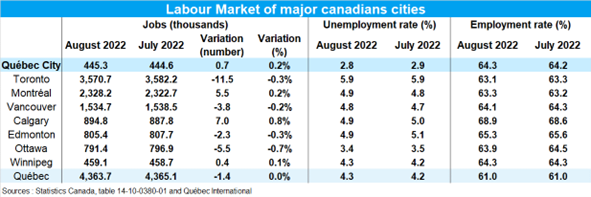Highlights
- The market remains especially tight in the region, with the unemployment rate reaching 2.8% in August (-0.1 percentage points), the lowest in Canada.
- The Québec City census metropolitan area’s (CMA) participation rate remained unchanged at 66.1%. This is similar to the level observed in August 2021 (-0.2 percentage points).
- The labour market in the Québec City CMA remained stable in August 2022 (+0.2%).
- Comparable data show that employment also increased from August 2021 to August 2022 in the province of Quebec (+1.7%) and Canada (+3.6%).
Charts
 Image Source: Statistics Canada. Table 14-10-0380-01.
Image Source: Statistics Canada. Table 14-10-0380-01.

Cautionary Note
The available data for the Québec City CMA was given special statistical treatment (three-month moving average) due to the small sample size, which has the effect of mitigating the large fluctuations in the data. Thus, the data collected in June and July influenced the estimations published for the month of August. Please also note that we use comparable data for the province of Quebec and the other CMAs in this document.
Commentary
Statistics Canada’s Labour Force Survey (LFS) shows that Québec City’s labour market remained stable in August, with 700 new jobs (+0.2%). There was a total of 445,300 jobs in the region, an increase of 8,700 (+2%) compared to the same period in 2021. This annual increase is similar to other major CMAs in Canada.
The market remains especially tight in the region as the unemployment rate dropped to 2.8% (-0.1 percentage points) in August, remaining the lowest in Canada. The participation rate, which represents the labour force expressed as a percentage of the population aged 15 and over, remained unchanged at 66.1% in August 2022. The participation rate affects the evolution of the labour market in the region and was similar to the rate registered a year ago (66.3%). Note that there were fewer jobs in August 2022 than in August 2019, which is explained by a higher participation rate (68.6%) in 2019 (see chart). Furthermore, the unemployment rate is at its lowest point and is identical for both periods.
Québec City’s good performance in employment seems to suggest that the region is in a good position to navigate the context of the fight against inflation by most central banks around the world. To this end, this week, the Bank of Canada raised its key interest rate for the fifth time in a row. This monetary restraint may lead to an economic slowdown in Canada. However, so far, good performance in employment, low unemployment rates and the many vacant positions seem to point to only a moderate slowdown.
Émile Émond
Economist
Québec International




